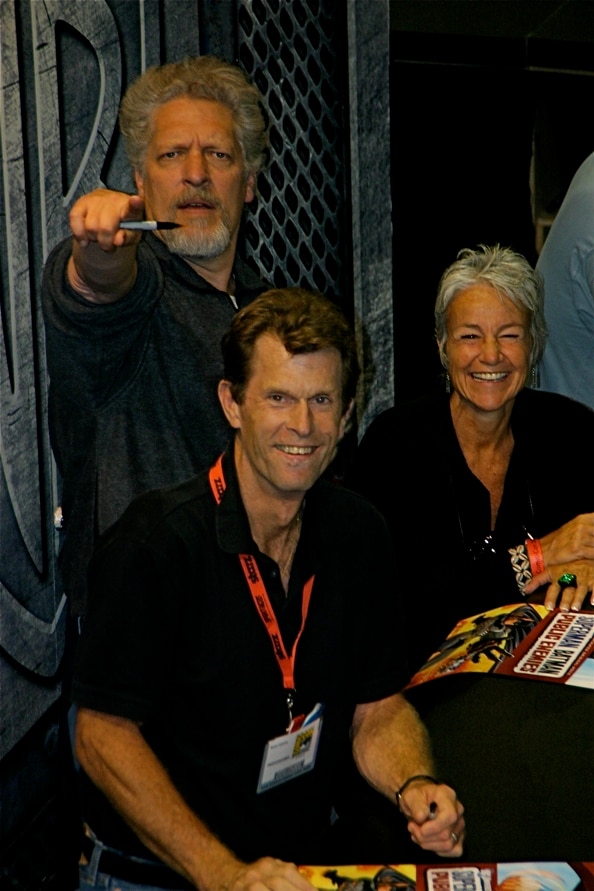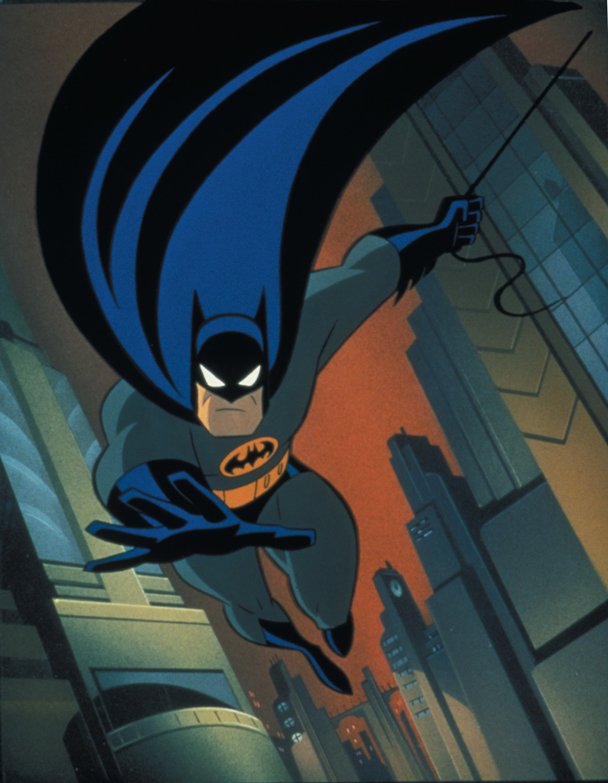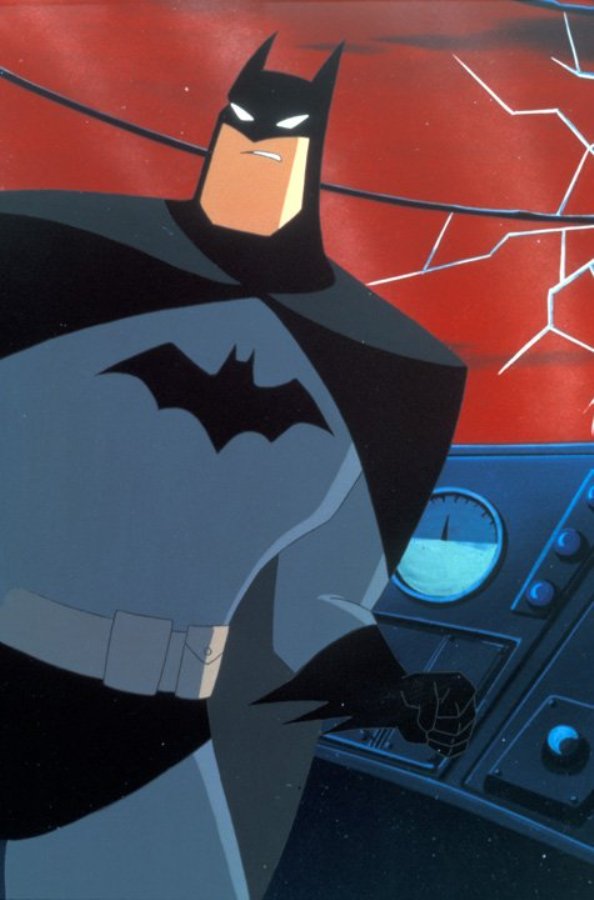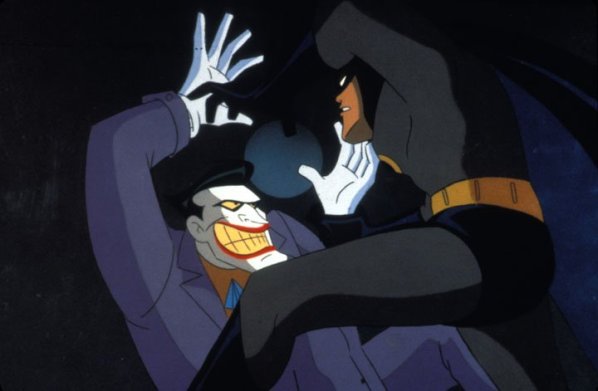For many fans, Kevin Conroy has been the definitive voice of Batman for over two decades, and it’s not hard to see why. From the first episode of Batman: The Animated Series to the recent success of the Arkham games, Conroy has shown us all sides of the Dark Knight, diving deep within the soul of Bruce Wayne and revealing an unprecedented level of depth and emotion within the character.
For the final day of “Batman: An Animated Celebration,” I thought I’d sit down with the ever popular voice actor and learn what it’s been like voicing such an iconic character for so long, whether his opinion of Batman has changed since the start and what it was like working with the equally beloved Mark Hamill.
Conroy promoting 2009's Superman/Batman: Public Enemies with Clancy Brown and Andrea Romano.
Kevin, you first started voicing Batman over twenty years ago, which means that as far as I know, you’ve now been associated with the character longer than any other actor. Did you expect that you’d have such a long association with Batman when you first got the job?
No, I had absolutely no expectation that this job would turn into what it became. I started recording it in 1991, and it went on the air on Fox in 1992 as a prime time series. Then over 23 years, it just evolved from Batman: The Animated Series to The Adventures of Batman and Robin to Justice League and then Batman Beyond. Since then, there’s been the direct-to-video movies and now the Arkham games.
He’s such an iconic character. He’s such a part of the American cultural landscape. It’s an amazing thing to be a part of and to have contributed to.
Like all actors, you never know where your career is going to go. You plan for things and you train for things, but you never really know the direction you’re going to go. So I had no idea that I was going to end up doing voice acting for animation and that I’d be voicing Batman. But it wound up working really well. The show is just a really good marriage of what I brought to the character and what Bruce Timm, Paul Dini, Andrea Romano and all the people putting the series together were looking for.
I heard that you originally wanted to read for the Joker. Is that true?
Well, that’s the problem with actors! Actors always want to do the thing that’s most out of their realm. So of course when I went in, I wanted to read for the Joker, for Bullock, for Commissioner Gordon… I wanted to read for all the character parts. Finally, Andrea Romano pulled me aside and said, “Don’t you get it? It’s called Batman. You would be in every episode! This is the role you should want!”
So I asked if I could try a different voice for Batman to make him really disappear in the mask. It doesn’t make a lot of sense to me that he’s the most powerful, wealthiest, most eligible bachelor in Gotham City, yet he puts on a cape and cowl and no one knows it’s him. So I suggested an alternate voice to really play up the mystery behind it which brought a little character into it for me, and made it a lot more fun.
I might not have originally wanted to play the square-jawed hero, but Bruce Timm and Paul Dini, they’re such incredible writers. They really got into the psychology of Batman. The show became a real psychodrama. There are some episodes like “Perchance to Dream” where you really get into the mind of Bruce Wayne, and it’s wonderful for an actor to get that kind of challenge in a role.
Has your approach for getting into the character changed? I’d imagine it must be second nature to you now.
It’s pretty second nature, but Batman… He’s a complicated guy, and that voice can’t be just a quirky voice that you as an actor put on. It’s a state of mind that you have to get into because that voice comes from such a deep well of pain. If you don’t really do it genuinely, it sounds artificial. It sounds like you’re just putting on a funny voice. You really need to invest it with a lot of emotion and a lot of backstory. At least, that’s what I’ve found.
Or maybe that’s just me. After all, I’m an actor and I come from a pretty serious theater background. So maybe I’m just reading all that into it.
I don’t know. Considering how much the fans love your portrayal of the character, it could be that rich level of emotion that they’re responding to.
I think it may be that! It really does seem to resonate. I’ve only recently set up a Twitter account for myself, and the response I get pretty regularly from fans is so heartfelt. People talk about how the show affected them twenty years ago when they were growing up, and how they’re now introducing their kids to it. People talk about Batman on such an intimate, adult level. You’re not talking about a cartoon. You’re really talking about a character who’s very close to a lot of people.
Was all of this there from the start for you? Or have your thoughts and your opinion of Batman changed since you first started voicing him?
Oh, it’s changed dramatically. I’m not as much of a comic book and animation maven as most of the audience is. I didn’t have comic books as a kid. I came from a very sort of traditional Irish Catholic upbringing and we just didn’t have that kind of stuff. When I went into the audition they asked me if I had any questions, and I said something about how I assumed they were doing the show like the 1960s Adam West Batman series. Of course, the response was something like, “No, no! That’s not it at all!!!”
I learned pretty early on how that particular take wasn’t really true to the comics and the character, but that was the only impression I had of Batman. I had to learn about the Dark Knight and the whole legacy behind the character.
It seems like when most fans think about the Batman: The Animated Series voice cast, they think of you and Mark Hamill. But how often did you and Mark actually get to record together? Did that ever happen and what was it like playing off of him?
Oh, we recorded together almost as a rule!
That’s a wonderful thing about Andrea Romano. She started out as an actor. So she has a real love for actors. She loves to work with them and has a great respect for them. She understands how actors work. She knows that to get the best performance from people, they need to be fed by other actors. If you’re acting in a vacuum, it’s just never as good. So she always insists on everyone being together. The bookings for all of Batman: The Animated Series were done as radio plays where she’d have all the cast in a studio together, and as a result, those recordings were phenomenal.
So Mark and I would work together as a rule, and we’ve always worked really well together. He’s a very talented guy. And talk about someone with knowledge about the history of animation! He has an amazing animation collection and almost an encyclopedic knowledge of the history of the genre.
So, one last question… What advice would you give to future Batman voice actors?
Don’t take the job and tell them to hire Kevin Conroy!
I’m kidding. No, I’d say to realize that the voice wasn’t created in a vacuum. It’s a voice that’s very organic from deep inside the man. If you don’t do it from there it sounds artificial, and the audience will pick up on it in a heartbeat. That’s something I really learned on Batman—to respect the audience. They love this character. They love all of the characters. And they will sense in a moment if someone’s not being authentic. So my advice to anybody would be to keep it genuine.
I can’t see anyone disagreeing with that.
But the best way to keep it genuine is to hire me! (laughs)
Kevin Conroy most recently voiced the Dark Knight in 2013’s Justice League: The Flashpoint Paradox. For news on what his next Batman project may be, we suggest following him on Twitter at @RealKevinConroy or visiting his website, www.realkevinconroy.com.
























